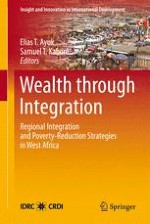2013 | OriginalPaper | Buchkapitel
9. The Role of Cash Transfers from Migrants in Promoting the Financing of Economic Development in WAEMU Countries
verfasst von : Ameth Saloum Ndiaye
Erschienen in: Wealth through Integration
Verlag: Springer New York
Aktivieren Sie unsere intelligente Suche, um passende Fachinhalte oder Patente zu finden.
Wählen Sie Textabschnitte aus um mit Künstlicher Intelligenz passenden Patente zu finden. powered by
Markieren Sie Textabschnitte, um KI-gestützt weitere passende Inhalte zu finden. powered by
